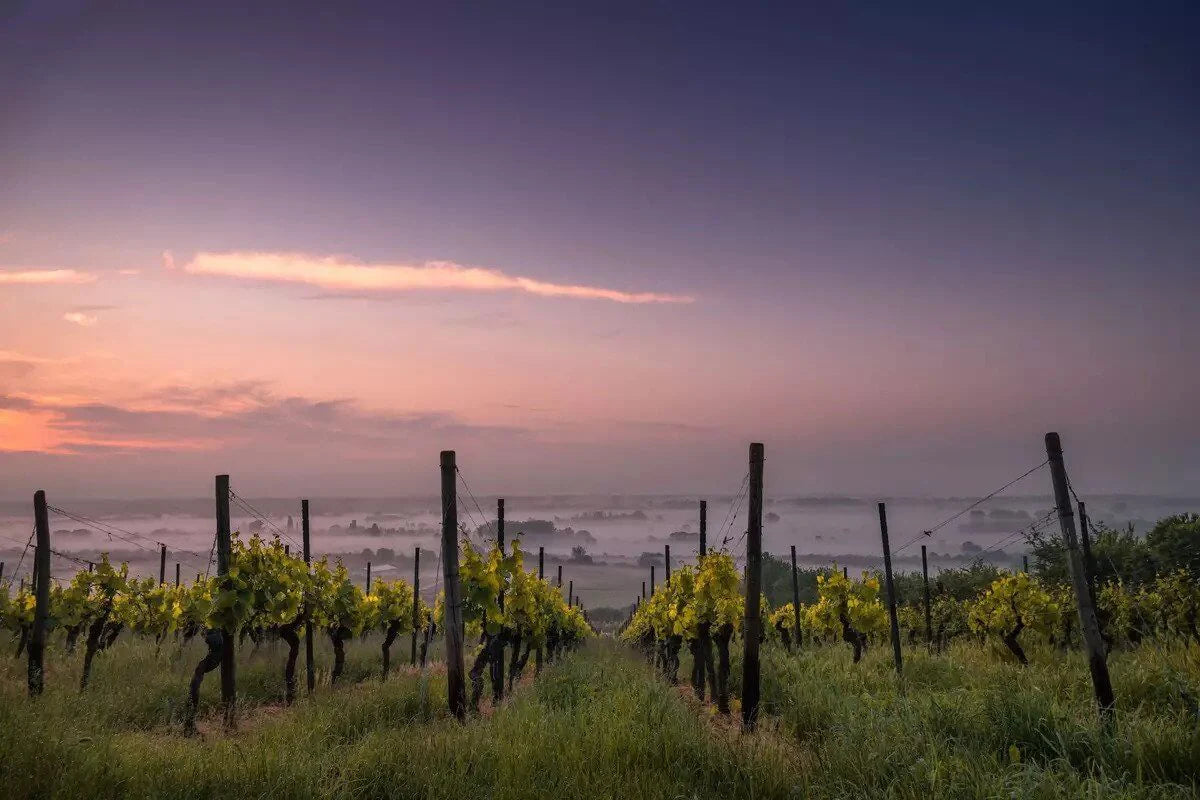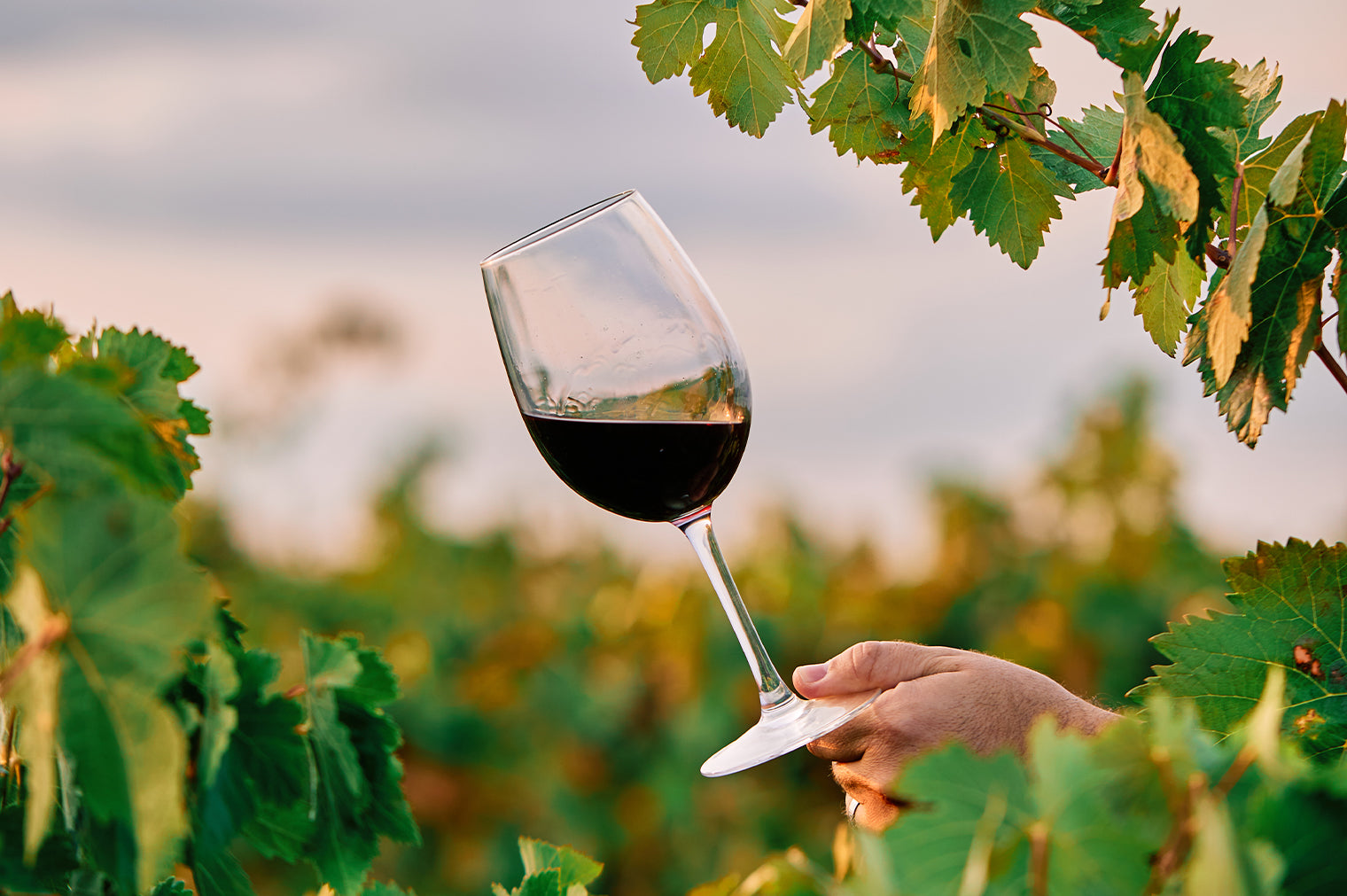Organic is one of those terms that may seem like a buzzword, but true organic practices are beneficial to the soils and biodiversity of vineyards. Those practices also contribute to wines that are free from certain chemicals that many people would rather not have in their wines.

Still, trying to determine what organic wine is can get confusing. You see the term on wine labels in a variety of forms, and depending on the phrasing and labeling, the organic wine standards can vary.
Let’s demystify organic claims that can be present on wine bottle labels.
What is Organic Wine?
When we think about organics, it’s often in the context of produce at the grocery store or the farmers market. In the context of produce (which many would argue, wine is) certified organics, in general, are fruits and vegetables grown without synthetic chemicals.
In the United States, for a wine to be certified organic by the USDA, both the grape growing and the winemaking must meet certification requirements, and those requirements are stringent.
The USDA says, “Organic is a labeling term found on products that have been produced using cultural, biological, and mechanical practices that support the cycling of on-farm resources, promote ecological balance, and conserve biodiversity [...] Organic producers rely on natural substances and physical, mechanical, or biologically based farming methods to the fullest extent possible. Organic produce must be grown on soil that had no prohibited substances (most synthetic fertilizers and pesticides) applied for three years prior to harvest.”
In theory, the purpose for organic certification is that the more natural style of agriculture produces healthier fruit and vegetables, and those foods are therefore healthier for us to consume. As society has become more health conscious and more environmentally conscious, more wine producers are moving towards organic grape growing practices–whether they’re certified or not–and sustainable agriculture.
Types of Organics in Grape Growing
Organic Agriculture
Classic organic agriculture is the easiest version to understand. Simply put, there aren’t any synthetics used in the vineyard. Using organic methods in the vineyard is better for the environment, but many producers go above and beyond to try to be more sustainable with their maintenance of the vineyard.
The use of cover crops is fairly common. Planting crops like mustard helps maintain soil moisture and keeps the soil cool protecting the ground from direct sunlight. Cover crops can also attract beneficial insects, ones that deter the harmful insects that damage vines and their fruit. Additionally, cover crops take up root space on the surface soil between the vines, this forces the vines to push their roots deeper into the ground giving the vine more access to necessary nutrients and water. Other sustainable practices include dry farming and no-till soil maintenance.
Biodynamic Agriculture
Biodynamics takes the general practices of organic farming and turns the dial up. The focus in this process is to turn the farm into a closed system that can operate without outside inputs. Compost is used as fertilizer, there is a series of natural preparations that are sprayed on the crops to help with plant health and pest control.
To be fully biodynamic, producers need to keep animals as well, allowing them to graze during vine dormant periods, and even using animal parts as a portion of the preparation schedule.
In the United States, the most common biodynamic certification is Demeter certification. Wine with the certification can be labeled “Made With Demeter Certified Biodynamic Grapes” or “Made With Biodynamic Grapes.” Those words may appear only on the back or side labels, never the front label.
Lutte Raisonée
Lutte Raisonée is a French term that translates to a “reasonable fight” or “the reasoned struggle.” It sort of indicates “we’re doing the best we can but sometimes, we have to use synthetics to save the grapes.” The idea behind this is to farm as organically and naturally as possible until it is absolutely necessary to intervene with synthetic products.
Typically farmers would only use synthetics if they were at risk of losing a large portion of their crops. Some farmers use Lutte Raisonée as a stepping stone to full organic production; others enjoy the freedom to intervene when necessary without losing a certification.
The Verbiage on the Wine Bottle
It’s not always easy to tell how the grapes that are eventually turned into wine were handled before they end up in the bottle. There is already so much information that needs to be conveyed on a label, from the producer, the location, the grape variety, or the blend. It can all get a bit overwhelming.
To clarify what different terms mean, here is a list of common terms.
Certified Organic Wine
This is one of the most strict labels, the grapes are grown in certified organic vineyards, and there are no non-organic ingredients including sulfur used in the winemaking process. Typically these wines have a CCOF badge on the label denoting that it is fully organic.
Made with Organic Grapes
When a wine is labeled “Made with Organic Grapes,” it means that every grape used in the production of the wine was certified organic. There is no guarantee that there aren’t non-organic ingredients like sulfur or GMO yeast going into the production of the wine. There is the possibility here that the producer doesn’t have the funding to get the winery certified as organic, but is meeting all of the standards in production.
Organic Grapes Listed as Ingredients
This typically implies that the wine was made with both certified organically grown and non-certified organic grapes. It’s possible that the grapes that are deemed non-organic were purchased from a producer that grows grapes organically but has not been certified.
Biodynamic Wine
This means that the winery is using only biodynamically grown grapes and the production of the wine is done in accordance with Biodynamics. The certifying body is Demeter.
Made with Biodynamic Grapes
Similar to the use of “Made with Organic Grapes” on a bottle, a label that says “Made with Biodynamic Grapes” means that grapes in the wine were grown biodynamically and the vineyard is certified by Demeter. The winemaking practices, however, may not be in accordance with biodynamic standards.
Natural Wine
This can be somewhat of a catch-all term as there is no legal definition of it in the United States. Typically, natural wine producers imply that they are using organically grown grapes (whether certified or not) and not adding anything to the wine (including lab-grown yeasts and Sulfur).
Big Hammer Wines
The wine experts at Big Hammer Wines taste thousands of wines every year from around the globe, looking for quality and value. This special offer reflects the passion we have for our clients.
Discover the world through its wines, Click Here! Visit Bighammerwines.com and become a wine expert!
















Share:
Elevate Your Holidays: Your Guide to Wine Pairing Perfection
How to Remove Wax Tops on Wine Bottles: A Simple Guide
Comments Section